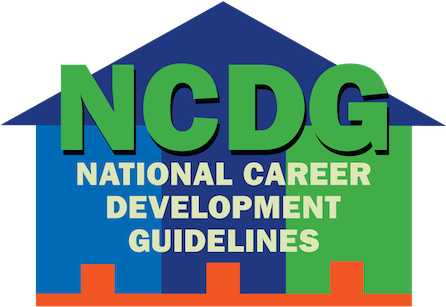
Search Domains, Goals, & Indicators
History of NCDG
A Brief History of the National Career Development Guidelines
The National Occupational Information Coordinating Committee (NOICC) first released the National Career Development Guidelines (NCDG) in 1989.
The U.S. Department of Education’s Office of Vocational and Adult Education (OVAE) commissioned the Guidelines Revision Project in 2003 to:
- update and revise the framework of competencies and indicators to align with the goals of No Child Left Behind (NCLB)
- expand the target audiences to include K-12 students and their parents, teachers, counselors and administrators, postsecondary students and other adults and the business community
The OVAE contracted for the creation of an expanded NCDG resource that contained these components:
- a framework of career development domains, goals and indicators
- career development activities and resources for youth and adults to use on their own or with family
- career development lessons, activities, resources and implementation strategies for educators, administrators, counselors and career development practitioners to support program development, delivery and evaluation
The materials in each component were designed to help youth and adults better manage their own careers or to help professionals design and deliver career development programs and services for youth and adults in many settings.
The OVAE contracted with DTI Associates, Inc. - A Haverstick Company (DTI) to manage the National Training Support Center (NTSC) projects including the update and revision of the National Career Development Guidelines (NCDG) framework. DTI charged a team of three career development experts with the responsibility of writing the new NCDG framework. Early in their writing process, they gathered input from a broad range of career development practitioners. They used the original 1989 NCDG as the foundation for the revision work. The writing team reviewed numerous other career development frameworks (e.g., the Canadian Blueprint for Life Work Designs, those from several US states and the American School Counselor Association's National Standards for School Counseling Programs) for content and organization. DTI also convened a work group that included representatives from America's Career Resource Network (ACRN), counselor educators, state departments of education, national associations, practitioners, career development experts and OVAE. The work group provided ideas and input throughout the development process, which extended for about a year.
The updated NCDG included a framework of career development competencies and indicators of mastery, and a recommended strategy for implementing career development programs for youth or adults.
This version was handed to the National Career Development Association (NCDA) in 2007 for the purpose of maintaining the standards. In 2023, the NCDA Board of Trustees approved the work of revamping and improving the NCDG for the purposes of
- matching 21st Century nomenclature
- creating a web-based document, with interactive elements
- encouraging use by the School Career Counselors & Specialists constituency
The document housed on NCDA’s website as of May 2024 is an updated framework. Future goals for the K-12 School Career Counselors and Specialists constituency will focus on building resources and activities that are current and useful for NCDA’s K-12 members and others in educational settings.
Contributors to the National Career Development Guidelines
2024 Revision Chairs:
Carla Cheatham
Assistant Clinical Professor, Online School Counselor Program
Seattle University
Celeste Hall, Career Coaching Certification Coordinator & Facilitating Career Development Instructor
Virginia's Community Colleges
Acknowledgments:
Melanie Reinersman, NCDA Website Editor
Thanks to Linda Kobylarz, M.Ed. for providing extensive background information about the development and content of the National Career Development Guideline and to Dr. Rebecca Dedmond for providing background context and connections.
2003 Guidelines Framework Revision Team
Linda Kobylarz M.ED. (Chairperson)
Career Development Consultant
Linda Kobylarz & Associates
Cal Crow, Ph.D.
Program Director
Center for Learning Connections
Highline Community College
Judith Ettinger, Ph.D.
Project Director
University of Wisconsin Center on Education and Work
2003 National Career Development Guidelines Revision Project Work Group
Judy Bowers, Ed.D.
Guidance Coordinator
Tucson Unified School District
President, American School Counselor Association (2004)
Cal Crow, Ph.D.
Program Director
Center for Learning Connections
Highline Community College
Raymond B. Davis, Jr., Ph. D., LPC, NCC, NCCC
Education Associate
South Carolina Department of Education
Karen DeCoster, M.Ed.
Massachusetts Career Resource Network Director
Massachusetts Department of Education
Judith Ettinger, Ph.D.
Project Director
University of Wisconsin Center on Education and Work
America's Career Resource Network
Cindi Gahris
Assistant Director
Office of Career-Technical & Adult Education
Ohio Department of Education
Edwin Herr, Ph.D.
Distinguished Professor Emeritus of Education
and Associate Dean Emeritus College of Education
The Pennsylvania State University
Linda Kobylarz M.ED.
Career Development Consultant
Linda Kobylarz & Associates
Dan Marrs, Ph.D.
Program Administrator
North Dakota Career Resource Network
Nancy S. Perry, NCC, NCSC,
Retired
Consultant
Pat Schwallie-Giddis, Ph.D.
Assistant Professor of Counseling
George Washington University
Contributing Authors
Phillippa and Dan Baran, Ph. D.
Baran & Baran
David Blustein, Ph.D.
Professor, Lynch School of Education
Boston College
Jay Carey, Ph.D.
Director, Center for School Counseling Outcome Research
University of Massachusetts, Amherst
Cal Crow, Ph.D.
Program Director
Center for Learning Connections
Highline Community College
This historical content was provided by Linda Kobylarz and edited by Celeste J. Hall and Melanie Reinersman.

